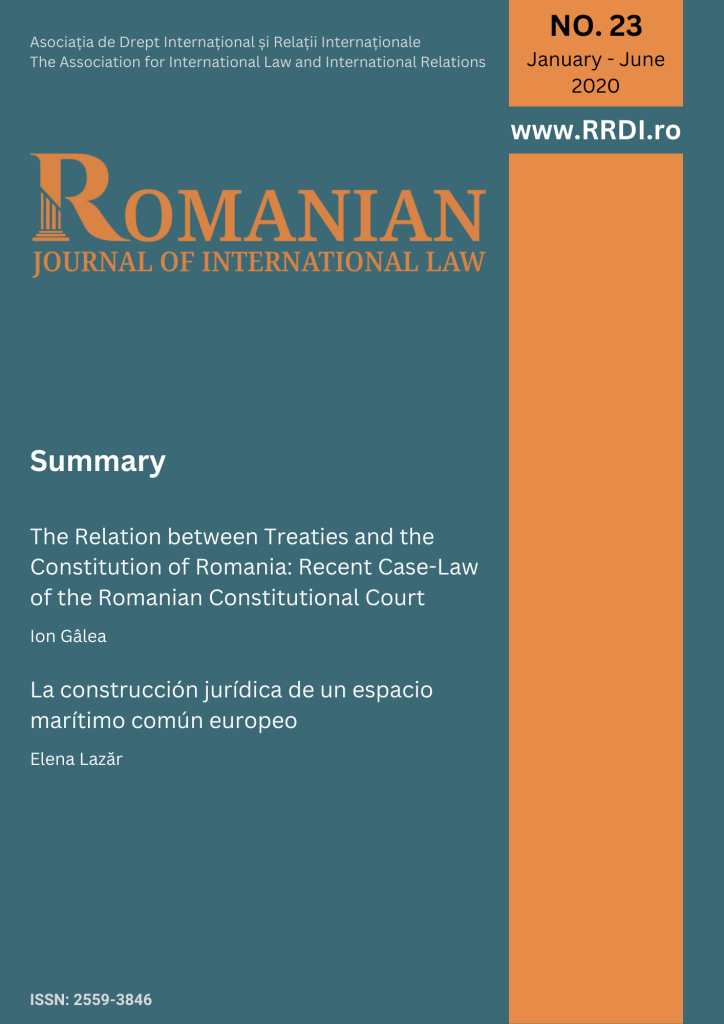Preliminary Focus on the Various Meanings of the Term ‘Transnational Law’
Radu Bogdan BOBEI
This paper addresses various meanings of the term “transnational law”. The evolving interactions between States and non-State actors – active members of the so-called “world society”, blurred the Westphalian distinction between international law and domestic law, respectively between public law and private law. State and non–State actors are involved often altogether in manifold cross-borders activities (exempli gratia, commercial and/or investment activities, labour activities). Such activities are in full need of suitable concepts and/or tools to be deployed in the transnational context from nowadays. Permanent evolving cross-border activities of the State and/or non-State actors enabled the scholars to debate passionately on the various meanings of the term “transnational law” (hereinafter “TL”). Such meanings encompasses, for instance, TL as body (field) of law (legal system), or TL as transnational legal process, or TL as method of decision making in international commercial arbitration, or TL as tool or experiment to be used in legal methodology, or TL as theory of law. The above‑mentioned meanings are frequently used in order to manage the interplay between international law and domestic law, respectively between public law and private law. Furthermore, such meanings are also used to accommodate the world society with the internationalisation of domestic law, respectively with the evolving of the conflict of laws conceived in the Middle Age as the “domestic or private (discrete) life” of the international law. For the purpose of writing this article, the author focuses on various meanings of the term “transnational law”. The meanings at stake are to be assessed in the light of the adjective “transnational” that is regularly attributed to multiple nouns and settings. The reader is going to find the idea that “transnational” is not (anymore) an ordinary adjective. It is the evolving life itself of the 21st century! Embraced by the internet, such evolving life can be described as being placeless and timeless.
Legal Implications of Outer Space Warfare – Part I
Andreea ZALOMIR
Beginning with 1966, under the aegis of the United Nations, five international treaties covering various aspects of states’ activities in outer space came into existence, the most important being the Treaty on Principles Governing the Activities of States in the Exploration and Use of Outer Space, including the Moon and Other Celestial Bodies or “the Outer Space Treaty” (OST). However, as technological development progressed and states incurred new vulnerabilities from their dependence on space-located assets, the danger of conflict in this new realm also increased, thus transforming outer space into an area of confrontation. Currently, there is no clarity as to the interpretation of international legal norms in the particular context of outer space warfare. The international legal community has promoted two initiatives, with the aim of drafting a manual on the applicability of international law in the context of space military operations. Both the Manual on International Law Applicable to Military Uses of Outer Space (MILAMOS) and the Woomera Manual on the International Law of Military Space Operations attempt to draw from other relevant manuals, such as the San Remo Manual or the Tallinn Manual which contain soft law rules on armed conflicts at sea and, respectively, on cyberspace conflicts.[1] The purpose of the present paper is to analyse the five UN treaties pertaining to outer space and to clarify certain issues related to the legal regime of this environment, such as the definition of outer space, the demarcation of outer space from airspace and the legal status of the geostationary orbit.
The Relation between Treaties and the Constitution of Romania: Recent Case-Law of the Romanian Constitutional Court
Ion GÂLEA
In March 2020, the Constitutional Court of Romania issued the Decision no. 142/2020, which represents an important development in the interpretation of the constitutional norms related to the relation between international law and domestic law. As a matter of principle, the Constitutional Court ruled that it does not have jurisdiction to review the constitutionality of a treaty to which Romania is a party, once the treaty had entered into force. The constitutional review is limited, in this case, the „external” requirements of the law for the ratification of that treaty. According to article 11 paragraph 3 of the Constitution of Romania, constitutionality of treaties can be reviewed only before consent to that treaty is expressed and, if non-conformities are found between the treaty and the Constitution, ratification can take place only after the revision of the Constitution. Nevertheless, as an ‘exception’, the Constitutional Court will maintain jurisdiction with respect to examining the conformity of treaties to which Romania is a party with ”fundamental principles of international law” which have a correspondent in the Constitution – as it is the case, for example, of the principle of compliance with fundamental rights.
The First Acknowledged Climate Change Refugee?
Adrian-Nicușor POPESCU
Climate change and, in particular, sea-level rise mostly affect the coasts of the low-lying island states from the Pacific Ocean, creating the premises for a future humanitarian crisis, because the affected population will have to be relocated to other territories. What should be done for the protection of the environmentally displaced persons? Could States agree to grant them the equivalent protection guaranteed to a refugee? The recent case of a national from the Republic of Kiribati, who searches refugee status in New Zealand after his homeland risks to be submerged, has brought us to the conclusion that sea-level rise could not be ignored anymore. The case was clearly a great opportunity for the acknowledgement of the “climate change refugee” status and showed that, in the future, we may witness a wave of migrants whose right to life is endangered by sea-level rise. Since complementing the legal definition of the refugee or creating new legal tools would be burdensome, we analysed the human rights perspective, which could be an appropriate alternative for enhancing the protection of the individuals affected by sea-level rise.

